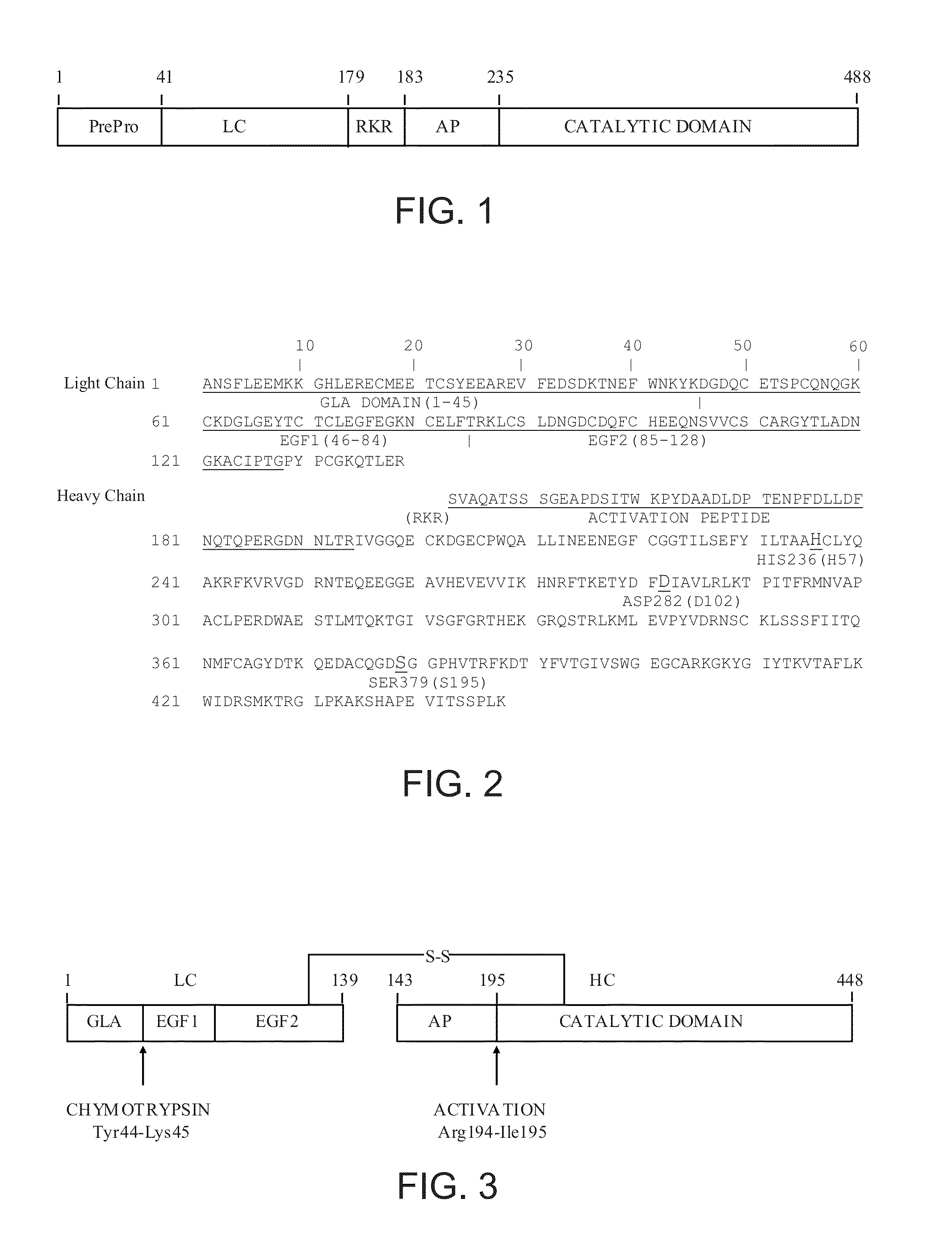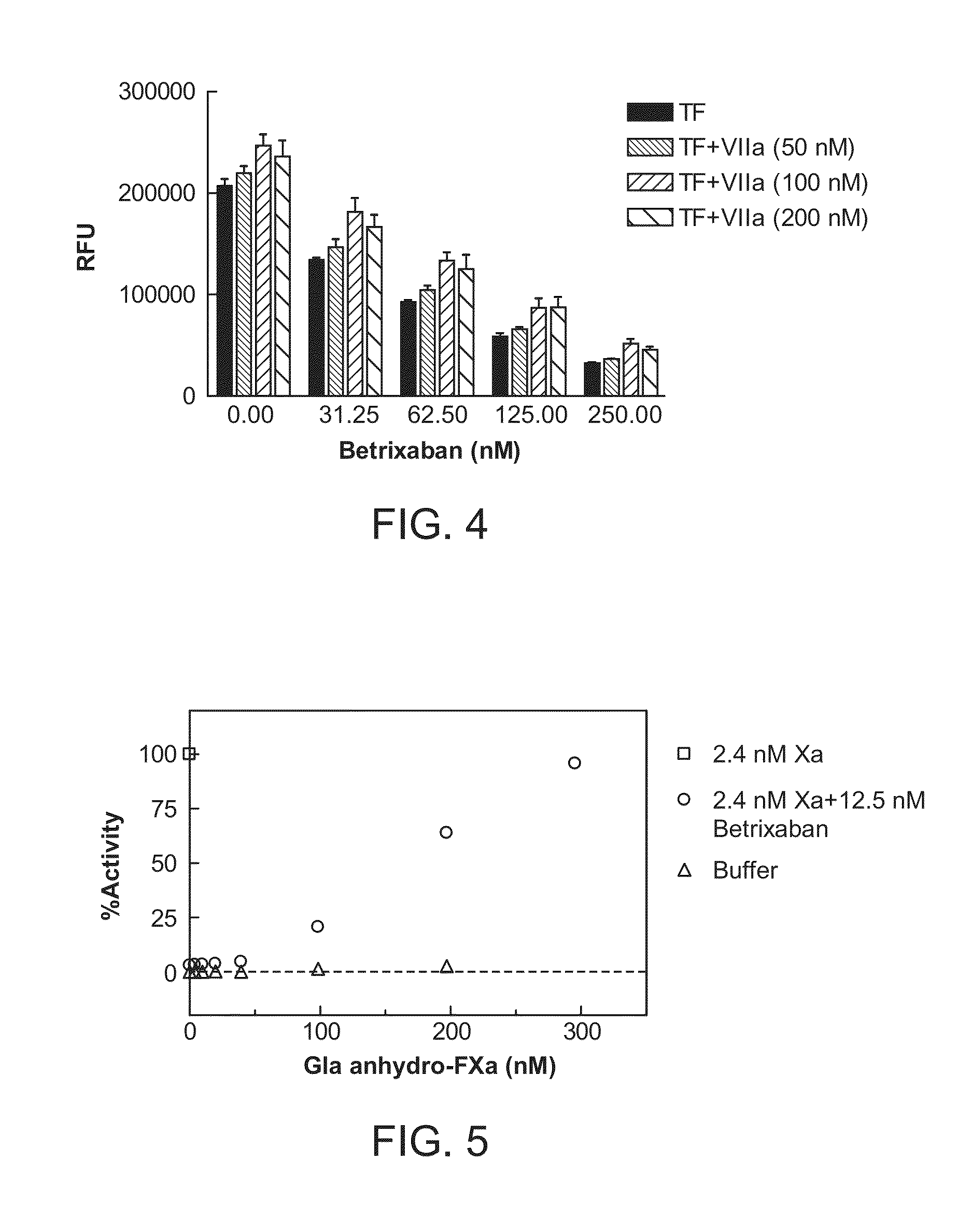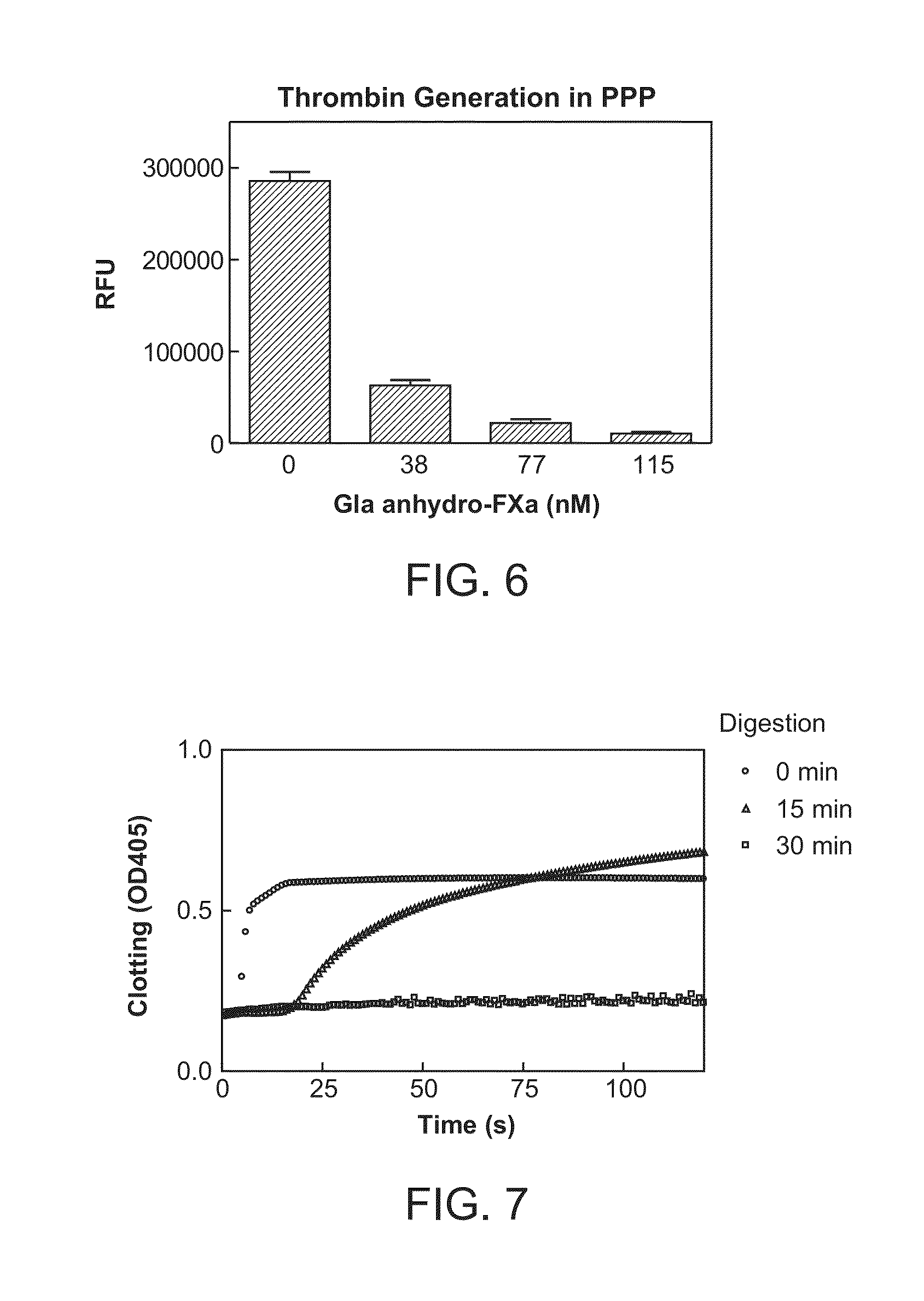Antidotes for factor Xa inhibitors and methods of using the same in combination with blood coagulating agents
a technology of factor xa inhibitors and anti-fxa inhibitors, which is applied in the direction of peptide/protein ingredients, extracellular fluid disorder, peptide sources, etc., can solve the problems of limited mechanistically achievable potential of rfviia to reverse the effect of direct fxa inhibitors, bleeding risk associated with treatments, and limitations on the ability to rapidly reverse anticoagulant activity, so as to reduce the amount of blood coagulating agents, reduce the effective dose of specifi
- Summary
- Abstract
- Description
- Claims
- Application Information
AI Technical Summary
Benefits of technology
Problems solved by technology
Method used
Image
Examples
example 1
Preparation of Des-Gla Anhydro-fXa by Chymotrypsin Digestion
[0285]Des-Gla anhydro-fXa was prepared according to the procedure of Morita, T. et al., J. Bio. Chem., 1986, 261(9):4015-4023 by incubating anhydro-fXa, in which dehydroalanine replaces the active-site serine, with chymotrypsin in 0.05 M Tris-HCl, 0.1 M NaCl, at pH 7.5 and 22° C. for 60 minutes. In a typical experiment setting, 0.5 milligrams / milliliter (mg / mL) anhydro-fXa was incubated with 5 units / milliliter (U / mL) α-chymotrypsin-agarose beads with gentle agitation. At the end of the reaction, the α-chymotrypsin-agarose beads were removed by centrifugation or filtration. This was followed by incubation with excess amount of inhibitors 4-amidino-phenyl-methane-sulfonyl fluoride (APMSF), tosyl-L-lysine chloromethyl ketone (TLCK), and tosyl-L-phenylalanine chloromethyl ketone (TPCK) to quench the residual fXa activity or any activity of chymotrypsin possibly leached from the beads. Gla-domain fragment and inhibitors were rem...
example 2
Thrombin Generation Assay in Platelet Poor Plasma (PPP) or Platelet Rich Plasma (PRP)
[0289]In this example, human platelet poor or platelet rich plasma samples were prepared from blood of healthy donors drawn into 0.32% citrate. PRP and PPP were prepared by spinning the anticoagulated blood at ˜100× gravity or 1000× gravity for 20 minutes, respectively, at room temperature. 75-100 microliter (uL) plasma was mixed with CaCl2 and Z-Gly-Gly-Arg-aminomethylcoumarin (Z-GGR-AMC, a thrombin fluorogenic substrate). Tissue factor (Innovin, Dade Behring) was added to initiate the generation of thrombin. For a typical experiment, the reaction mixture contained 15 millimolar (mM) Ca2+, 100 micromolar (μM) Z-GGR-AMC, and 0.1 nanomolar (nM) tissue factor (TF) (Innovin). Thrombin formation was monitored continuously at 37° C. by a fluorometric plate reader (Molecular Devices) measuring the relative fluorescence units (RFU). Inhibitor and antidote, when present, were pre-incubated with plasma for 2...
example 3
Clotting Prolongation Assays
[0291]Two clotting assay formats were used to test the effects of factor Xa inhibitors and the antidote on clotting prolongation. In the first format, a 96-well plate was used to measure multiple samples at the same time. In the second assay format, aPTT was measured with a conventional coagulation instrument (MLA Electra 800 automatic coagulation timer).
[0292]In the 96-well plate format method, human platelet poor plasma or platelet rich plasma was prepared similarly as procedures in Example 2. 75-100 μL plasma was recalcified with CaCl2, incubated at 37° C. for 3 minutes and clot formation was initiated by adding tissue factor (Innovin, Dade Behring) or an aPTT reagent (Actin FS, Dade Behring). Change of OD405 was monitored continuously by a plate reader (Molecular Devices). Clotting time was defined as the time (second) when the half maximal value of absorbance (0D405 nm) change was reached. Factor Xa inhibitor and antidote, when present, were pre-incu...
PUM
 Login to View More
Login to View More Abstract
Description
Claims
Application Information
 Login to View More
Login to View More - R&D
- Intellectual Property
- Life Sciences
- Materials
- Tech Scout
- Unparalleled Data Quality
- Higher Quality Content
- 60% Fewer Hallucinations
Browse by: Latest US Patents, China's latest patents, Technical Efficacy Thesaurus, Application Domain, Technology Topic, Popular Technical Reports.
© 2025 PatSnap. All rights reserved.Legal|Privacy policy|Modern Slavery Act Transparency Statement|Sitemap|About US| Contact US: help@patsnap.com



